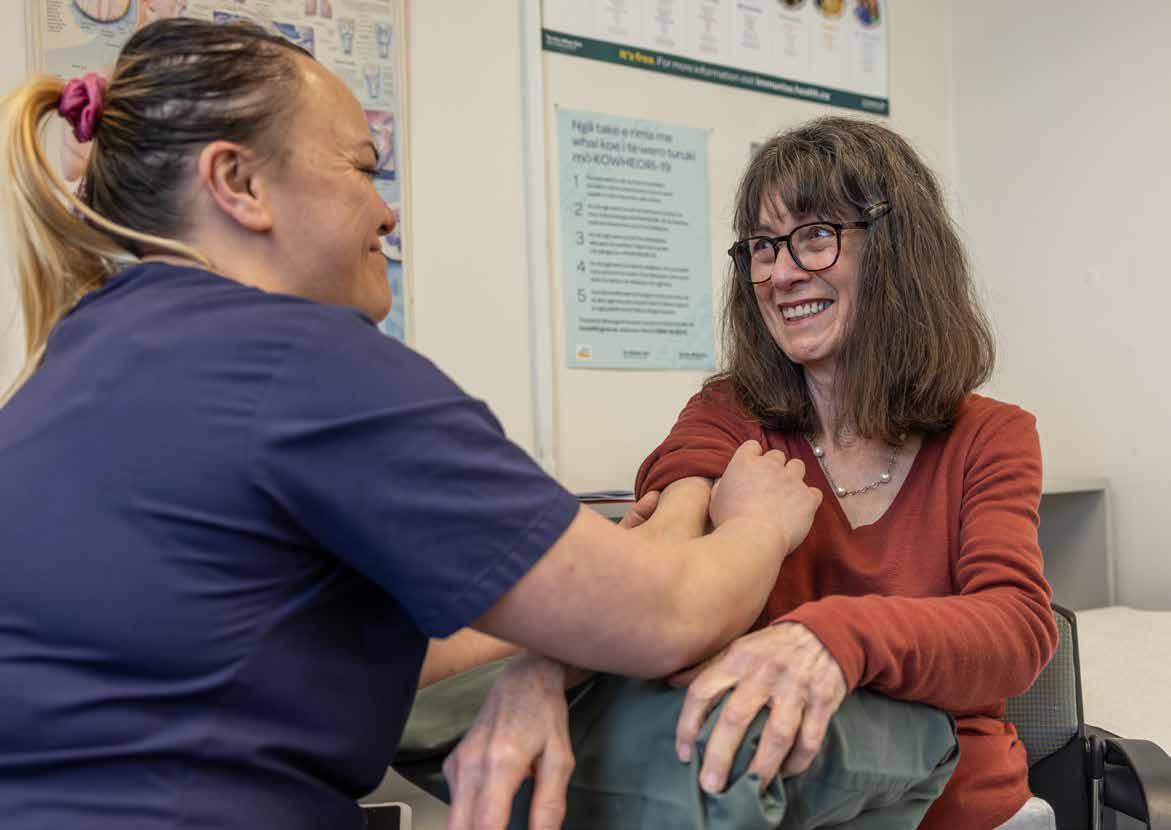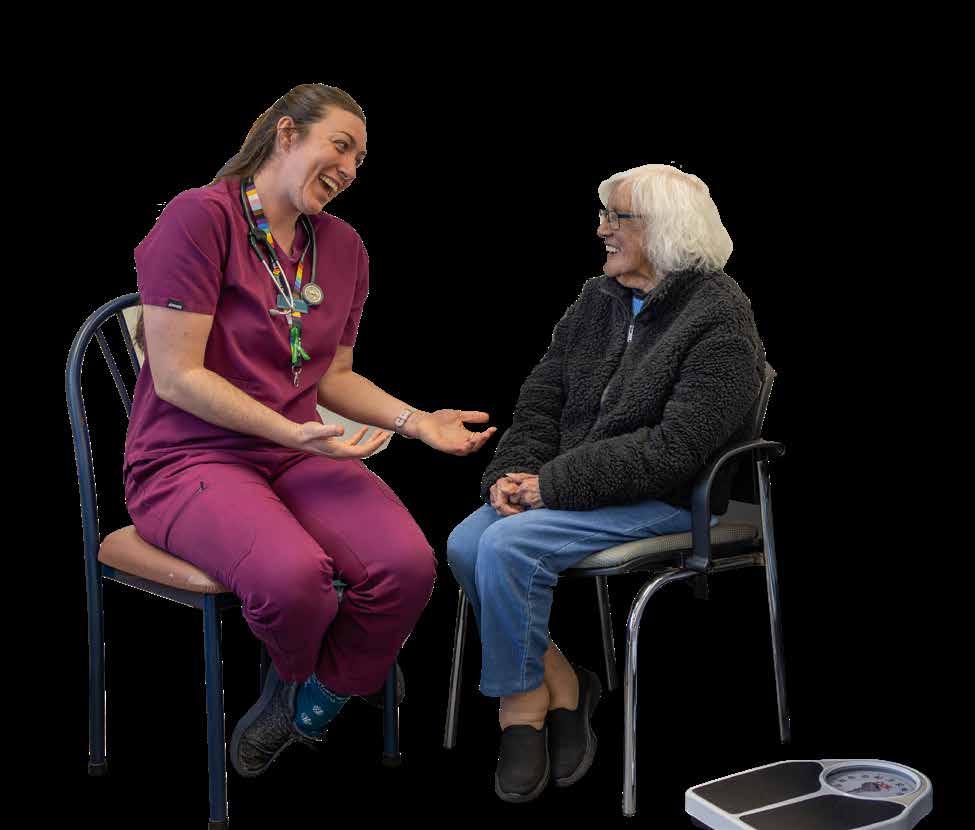
Kia atawhai ki te tangata
Care for our people





Kia atawhai ki te tangata
Care for our people



Pegasus Health is a Primary Health Organisation with a focus on improving the health of people in Waitaha Canterbury.
We were formed 30 years ago by a group of local general practitioners who had a vision for what primary care could achieve.
We lead, enable, and collaborate across the primary health care sector in Waitaha, with an increased focus on partnering across Te Waipounamu. We are dedicated to ensuring all people have access to the primary health care they need, when they need it, closing the health equity gap. We are committed to threading equity and Te Tiriti o Waitangi through all we do and how we operate.

This phrase was gifted by Ngāi Tūāhuriri to encompass the work that we do for our people.
Dr Te Maire Tau, Ngāi Tūāhuriri Upoko, Ngāi Tahu Historian and Director of the Ngāi Tahu Research Centre at the University of Canterbury drew on the philosophy laid down by Ngāi Tūāhuriri Upoko, Pita Te Hori who said in 1861: Kia atawhai ki te tangata - Care for our people, and gifted this statement to Pegasus Health.
Jane Huria Pegasus Health Board Member

Tēnā koutou katoa,
This year has brought significant pressures and changes to primary care and our wider health system. Our focus has been on strengthening our support for our general practice network, and working with regional and national partners to improve coordination and integration across the health system.
General practice teams and wider primary health providers remain a crucial entry point into health care and the point of continuity for most. Despite the challenges, we continue to build on our collective strengths and leverage the enormous capability of primary care in Waitaha Canterbury.
The capability of our network and organisation continues to enable our communities to receive care close to home and is a strong contributor to key outcomes that mean our population is 16% less likely to end up in the Emergency Department, and 44% less likely to be medically admitted to hospital than other like-sized districts.
Together with the Board, we have clarified our strategic direction, focusing on collectively improving health outcomes for our communities, with a material reduction in disparities.
Our 2025-2030 strategic plan focuses on our role to catalyse transformation in primary care. Our role and purpose are featured within this report.
As the primary care landscape continues to evolve, so too must our role. Developing our value proposition has been an important focus, ensuring that our services, capability and approach supports general practice to deliver excellent and equitable care to communities.
This year, we’ve focused on improving our services and infrastructure in response to your feedback. This includes the redevelopment of GPVu into the enhanced Practice View and Pegasus World to Wā Kāinga, creating Clinical Connect (previously Small Group Education) as an online resource, and re-establishing director slots to support ongoing engagement. Through the Primary Care Taskforce, we’ve also dedicated efforts to strengthening the capacity of general practice teams. We addressed staffing challenges at our 24 Hour Surgery, ensuring patient safety by temporarily reducing opening hours. Thanks to close collaboration with our health partners and successful nursing recruitment, the clinic is now fully operational 24/7, with contingency plans in place to support patient care during high-volume periods.
We established a joint venture with Paenga Kupenga (the economic arm of Ngāi Tūāhuriri) and Te Taumutu Rūnanga, and through this partnership acquired Lincoln Medical Centre (LMC), furthering our commitment to work with strategic partners in our community. LMC is a well-aligned, high performing practice that supports our commitment to sustaining general practice in Waitaha. This partnership extends beyond business, deepening our relationships with mana whenua and reinforcing our shared commitment to improving health care access for Māori and priority populations.
We’re committed to further strengthening our support for general practice and wider primary care partners, and to strive for a primary care system that is sustainable, innovative, and highly accessible.
To everyone across the Pegasus network, thank you for your unwavering commitment and the warm welcome you’ve extended to Kim in her first year in the role. We are proud of what we have accomplished so far and look forward to another year of collaboration, growth, and manaakitanga for our community.
Ngā mihi,
Barry Bragg
Board Chair,
Pegasus Health (Charitable) Ltd.
Kim Sinclair-Morris Manukura | Chief Executive Officer, Pegasus Health (Charitable) Ltd.

Our values
Our values guide how we interact with people within and outside of Pegasus Health. Our people, purpose, values, and culture ensure we work successfully with our communities, partners, and each other.
Manaakitanga is our guiding principle. Looking after people is both our core reason for being and how we are most effective.


We are inclusive – every voice is important to us. We act with integrity doing what is right.
We connect – together we succeed. We strive for better every day.

Our purpose
By 2030, the health outcomes for people in our takiwā have improved substantially with a significant reduction in inequities in access and outcomes.




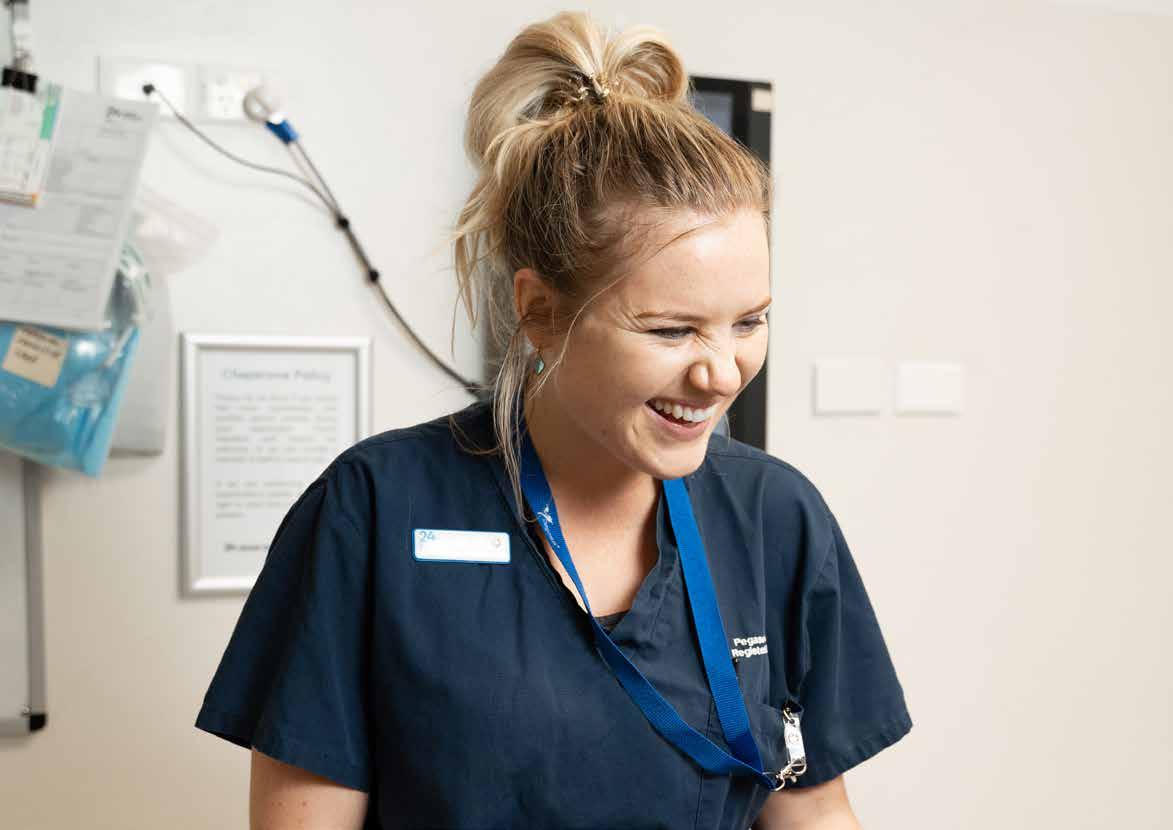
In September 2023, Pegasus Health 24 Hour Surgery faced significant staffing challenges, particularly a shortage of nursing staff. This led to a temporary reduction in the clinic’s operating hours, closing from 10pm to 8am daily. The decision to reduce hours was made to ensure patient safety and provide care during the busier periods of the day.
During the months that followed, the 24 Hour Surgery worked closely with partners across the Waitaha Canterbury health system, including Health New Zealand | Te Whatu Ora, Hato Hone St John, and Healthline, to mitigate the impact of the reduced hours on patient care.
By the start of December 2023, the clinic began to reopen for overnight services on Sundays and Mondays, reflecting an
improvement in staffing levels. In January 2024, 24 Hour Surgery was pleased to announce its return to full 24/7 operations, thanks to the successful recruitment of 14 Full-Time Equivalent nursing staff.
“Patient safety is always at the heart of our decision-making,” General Manager Patient and Provider Services, Lisa Brennan, said. “We are thrilled to be fully operational again and ready to provide care to our community around the clock. The dedication of our teams and partners during this period has been outstanding.”
While the clinic has returned to full capacity, contingency plans remain in place to ensure that high patient volumes can be managed safely.
Pegasus Health launched the Refugee Health Service, a confidential and free health programme supporting former refugees to access health care in Ōtautahi Christchurch and Ashburton.
Pegasus has set a national benchmark, expanding eligibility criteria to include refugee groups beyond the annual quota refugees, ensuring broader access to health services, including harder-to-reach populations.
“At Pegasus we aim to reduce inequity and remove barriers by having competent and well-funded wraparound services. The service design is based on feedback we received from former refugee communities,” Pegasus General Manager Patient and Provider Services, Lisa Brennan, said.
The Refugee Health Service support includes help with general practice enrolments, guidance through initial primary care appointments, interpretation services, and assistance in accessing allied health services.
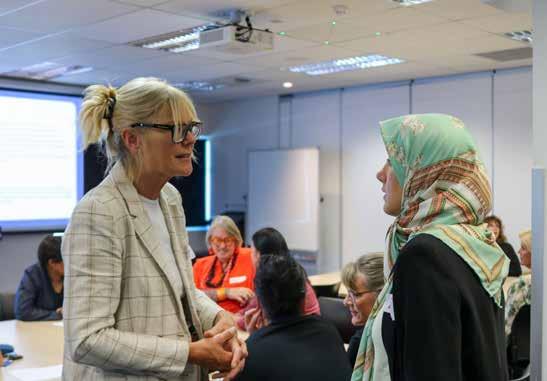
257
people helped by the Refugee Health Service team
Team members from Te Puna Wai Ō Tuhinapo Youth Justice Residence (Te Puna Wai) and Te Tahi Youth, gathered in April to foster relationships and improve health care outcomes for residents. The hui focused on creating a more integrated health care system for vulnerable rangatahi.
Te Tahi Youth General Practitioner, Ellie McDougall, has been a pivotal link between the two organisations facilitating better coordination of care through twice weekly clinics at Te Puna Wai. Despite ongoing collaborations, many staff members had never met face-to-face. Te Tahi Youth General Manager, Fiona Kay, championed the idea of an in person meeting to bridge this gap. The hui featured informal discussions, allowing team members to network, share challenges, and discuss effective initiatives.
A significant focus was placed on the continuity of care for Te Puna Wai residents, who often have complex health concerns.
“Te Tahi Youth are happy to accept general practice enrolments and referrals for our rangatahi on discharge from Te Puna Wai,” Team Leader Residential Youth Health Services, Leanne Doake, said.
Te Tahi Youth provides a range of specialised services for tamariki and rangatahi aged 10 to 25, including support for those who are gender questioning, dealing with substance abuse, or who have employment challenges, accommodation needs, and mental health issues. Services at Te Tahi Youth are free, removing financial barriers and ensuring accessible care.
The 23rd annual Pegasus Health Workforce Development Scholarship ceremony was held at Tūranga (Christchurch main library) in June.
Established in 2001, these scholarships support students pursuing health qualifications from Māori, Pacific, and CALD (Culturally and Linguistically Diverse) communities. This year, 15 outstanding students were awarded scholarships, marking another year of Pegasus Health’s commitment to fostering diversity and leadership in the health sector.
The evening embodied the essence of the whakatauki “Nāu te rourou, nāku te rourou, ka ora ai te iwi” – With your basket and my basket, we will sustain everyone. There was an overwhelming sense of unity in the room, reflecting a shared commitment to improving the lives of future generations.
Vui Suli Tuitaupe, the evening’s Master of Ceremonies was a previous scholarship recipient, and has since built a successful career as a Registered Nurse in primary care. Suli highlighted the significance of the Scholarship Awards in making connections for the betterment of our communities.
Congratulations to the 15 scholarship winners.
• Alanah Roberton
Ngāti Ranginui
• Chong Liu Chinese
• Esther Vuluma
Fijian
• Keely Stuart
Te Aitanga-a-Māhaki
• Nasratullah Hamid
Afghani
• Nikki Aranui
Tuhoe, Ngāti Pahauwera, Ngāti Porou
• Rai Togiaso (pictured)
Samoan
• Rita Shito
Middle Eastern
• Salome Ratulevu
Fijian
• Senuka Wijayasooriya
Sri Lankan
• Sienna Harding
Sicilian, Ngāpuhi, Ngāti Wai, Ngāti Porou
• Tai Lolohea
Tongan
• Taryn Williams
Ngāti Kahungunu
• Vincent Lasei
Samoan
• Zaria Grant
Ngāti Maniapoto, Fijian Indian

Redwood Clinic celebrated successfully passing the Foundation Standard on their initial assessment, a rare feat says seasoned assessor, Rachel McAllum.
Redwood Clinic Practice Manager, Melissa Pearson, explained how effective Smartsheet use for self-assessment, early assessor access, and pre-assessment preparations played a pivotal role in their success. By engaging in open dialogue and seeking feedback from their assessor before the site visit, Redwood Clinic ensured
a smoother process, allowing for corrections and reducing stress for their staff. Melissa emphasised the importance of reading the Foundation Standard guidance resources in advance, which provided clarity and a shared understanding of the requirements. They also acknowledged the need for consistent document control and integrating updates from the Royal New Zealand College of General Practitioners (RNZCGP) into their preparations.
Allocating practice time and involving the entire team in the process proved vital to Redwood Clinic’s success. Assigning specific tasks, setting deadlines, and regular check-ins ensured progress was steadily made. A structured timetable, with dedicated time off on Wednesday afternoons, enabled focused work on indicators. Being proactive and organised allowed the clinic to approach the assessment day with a sense of preparedness and confidence. This ensured they were able to keep their focus on providing exceptional care for patients.

Spotlight on general practice
A new health club, 1 Health, opened in the growing community of Wigram, offering patients a holistic health and wellbeing package. Opened in April by the husband and wife team of Dentist, Dr Jennifer Tirtawijaya, and General Practitioner (GP) Dr Bernard Teo, the philosophy at 1 Health is to provide head to toe health care by integrating a broad spectrum of health services.
More than just a medical facility, 1 Health offers members access to an extensive network of health and wellbeing services, including physiotherapists, podiatrists, and optometrists, alongside partnerships with fitness clubs and insurance providers. This model supports health outcomes and strengthens the local healthcare ecosystem by fostering robust business relationships among providers.
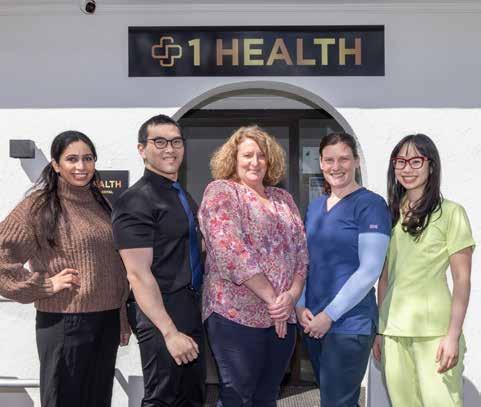
Dr Teo recognises the limitations imposed by typical 15-minute consultations, and advocates for a more patient-centered approach.
“The way primary care is set up, with 15-minute appointments as the standard, means it is difficult for us to give each patient the time and attention they deserve,” Dr Teo said.
In response, 1 Health offers extended appointment times, including one-hour GP review appointments with 30-minute reviews with the nurse beforehand and comprehensive check-up packages which also include dental reviews.
Running a successful immunisation programme requires a blend of proactive initiatives, pre-calls and recalls, and patient engagement. Tend Waltham Medical Centre (Waltham) is an excellent example of how these approaches can boost vaccination rates and promote community health.
Led by Registered Nurse, Tracey, and recent graduate nurse Kristen, the practice uses a multifaceted approach which begins with proactive patient outreach. “Pre-call texts generate a positive response as we already have well established relationships with our patients,” Tracey said.
Waltham also focuses heavily on opportunistic recalls. By checking patient due dates and eligibility for funded vaccinations ahead of appointments, they achieve excellent acceptance rates. This approach extends to Waltham’s general practitioners who also leverage opportunistic recalls in patient consultations.
With recent funding changes for the Bexsero vaccination, Tracey and Kristen prioritised and effectively caught up with the fouryear-old cohort before they turned five, ensuring they did not miss out on funding eligibility. They then utilised the 18-month recalls to catch up the remaining tamariki in the funded group.
Waltham’s success is underpinned by their strong relationships with patients, an understanding of patient preferences, and effective communication with whānau. For Māori and Pacific peoples with lower immunisation rates, the practice utilises a personalised approach, leveraging connections, and face-to-face interactions with whānau to encourage vaccination uptake.

In September 2023, the National Cervical Screening Programme (NCSP) introduced a new self-test option for cervical screening in Aotearoa New Zealand.
In Aotearoa, 85 percent of people who develop cervical cancer have either never been screened or have not had regular screening. With the recent changes, the NCSP aims to reach more people.
The cervical screening tests available are:
• Self-test
• Self-test with assistance from a trained professional
• Liquid based cytology-test (previously referred to as a smear test).
Piki te Ora Health Centre has a high priority population. Primary Health Care Nurse, Melanie Taylor (pictured), led the mahi at Piki te Ora Health Centre who were part of the new self-test pilot programme.
“We screened many people who haven’t been screened before or hadn’t been screened for more than five years. During the pilot programme we recalled 500 people, and screened 197, which we were thrilled with as our aim was to screen 200,” Melanie said. “We felt encouraged to have wāhine coming in after the pilot finished for their self-test screening. We ended up creating a list of wāhine and once the rollout went live we invited them back to be screened.”
“Since the rollout there has been a surge of priority groups opting for the new self-test. Self-testing is an essential tool to help increase cervical screening rates, both to close the equity gap and to move closer to the government target of 80 percent, as we work toward eliminating cervical cancer,” Pegasus Health Population Health Specialist, Anna Thorpe, said.
96,444
The Pegasus network has seen an encouraging increase of cervical screens since the new Human Papillomavirus (HPV) test was rolled out in September 2023.
4,000 INCREASE
Since the September 2023, Pegasus practices have increased the number of screens by 4,000. The eligible population has increased by 3,000.
69.4% MĀORI 61%
The largest cervical screening increase has been observed among Māori and Pacific Peoples.

This year Pegasus Health launched Administration and Reception Training (ART) sessions. These are an opportunity for general practice staff to network, share ideas, and learn about critical aspects of funding and practice management.
April 2024 saw more than 60 general practice administrators and receptionists attend the inaugural ART session at Pegasus House.
The workshop facilitated a dynamic exchange of ideas and experiences, fostering an environment of collaborative learning. Pegasus Privacy Advisor, Rebecca Hawkins, led participants to act out different privacy scenarios in a team exercise that was well-received. This engagement highlights the event’s success in providing a strong platform for professional development.
Feedback was solicited from the attendees which yielded positive responses. These insights are being evaluated to refine future sessions.

Founded in the 1990s, the Clinical Connect Peer Education Programme (formerly known as Pegasus Small Group Education) has been a cornerstone to supporting best practice for general practitioners (GPs). Initially focused on prescribing and the use of lab tests, the programme’s success has always stemmed from its commitment to evidence-based practice, the use of robust data, independence from industry influence, and a dedicated focus on primary care.
Today, the programme continues to make an impact, supporting over 1,000 primary care clinicians across Waitaha Canterbury, including GPs, nurse practitioners, practice nurses, and community pharmacists. This represents 87 percent of the region’s practices and pharmacies, underscoring its broad reach and significance.
Unique in its delivery across multiple professions and with an increasing focus on the social determinants of health, the programme has evolved to tell a richer story of its impact. This year, the Clinical Quality and Education team presented their first programme impact report, offering fresh insights into the programme’s influence on the healthcare landscape.
Key highlights from the report include:
• Positive impacts on the knowledge, capability, and confidence of clinicians in Waitaha
• The programme’s growth in Waitaha, creating opportunities for stronger connections and a more resilient primary care workforce
• High relevance of 2023 topics, supporting the delivery of best practice in primary care
• A redefined impact measurement strategy and framework that aligns with new goals.
In April 2024, Waitaha Canterbury said goodbye to the Canterbury Clinical Network (CCN). Established in 2010, CCN was a collaborative of health professionals, mana whenua, consumers, and cross-sector partners working together to decide how, when, and where health services were delivered.

The elements that made CCN a success included:
• A commitment to a shared vision of an integrated system, centred around the needs of people and whānau
• High trust relationships contributing to the confidence to share resources and working collaboratively
• Distributing leadership and valuing diverse perspectives, skills, and experiences
• Having permissive leaders willing to share decision making and control
• Being a mechanism for bringing people together in a neutral space, where they held equal power
• Sharing and using data to inform decisions and identify opportunities for improvement
• A focus on equity with courage to direct resources where they were most needed
• Building trust through transparency.
A number of programmes developed and run by CCN are now part of the Pegasus team, including the Better Breathing Pulmonary Rehabilitation programme and management of Shared Care Plans.
Over the years, CCN has faced many challenges, driven innovation, and shaped meaningful change across our health system. While this year marked the conclusion of CCN’s journey, Pegasus is committed to carrying forward the lessons, values, and collaborative spirit that champion CCN.

Pegasus Health and the Canterbury Community Pharmacy Group (CCPG) launched the “Read, Remove, Return” campaign in October 2023. Through social media and strategically placed posters in pharmacies and medical practices, the campaign helps to educate individuals about the safe disposal of unused medicines and advocates for proper medication storage.
Keeping excess medication at home can pose risks, especially for children and elderly patients who may have multiple medications or frequent changes in their prescriptions.
“Unused and unwanted medicines are not safe to recycle, reuse or donate, so if you have any unwanted medicines bring them into your community pharmacy and they will dispose of them safely, [former] CCPG General Manager, Aarti Patel, said.
While the campaign stresses the importance of safe disposal, it also addresses the significance of proper medication storage within our homes. To create a safer environment for everyone, it is recommended to store medicines in dry and secure locations, avoiding areas prone to dampness, such as bathroom cupboards.

Te Aka Whai Ora and Health New Zealand | Te Whatu Ora established Comprehensive Primary and Community Care Teams (CPCTs) to strengthen Aotearoa New Zealand’s primary and community care systems. These teams integrate traditional general practice services with new roles like physiotherapists, pharmacists, care coordinators, and kaiāwhina. This aimed to create a more comprehensive and cohesive health care offering that enhances equity of access, particularly for Māori, Pacific peoples, tāngata whaikaha (disabled people), and those living in rural or high priority areas.
In Waitaha Canterbury, Methven and Rakaia, are making the most of their CPCT funding to improve community health outcomes. The Methven Medical Centre and Rakaia Medical Centre, working in collaboration with Tangata Atumotu Trust, have used their funding
to hire care coordinators, pharmacists, and kaiāwhina. These roles integrate with the wider practice team to offer a more holistic and accessible service to their communities, ensuring better continuity of care and proactive support.
“It’s exciting to see how practices like Rakaia and Methven are embracing the opportunities presented by the CPCT model. These teams are not just about adding new roles but about working together to transform the way care is delivered,” Pegasus Health’s CPCT Implementation Lead, Linda Wensley, said.
By adopting this integrated approach, both medical centres are ensuring their communities receive the care they need, when and where they need it.
Pegasus Health partnered with Ngāi Tahu mana whenua through Paenga Kupenga and Te Taumutu Rūnanga with a vision of delivering equitable health care in Waitaha Canterbury. By establishing a charitable venture, the partnership aims to create a sustainable primary care network to improve access to health services for Māori and priority populations.
The first achievement was the acquisition of Lincoln Medical Centre in early 2024. This milestone allowed Pegasus to gain
experience in practice ownership while learning from the existing owners and team.
This venture is part of a larger investment strategy including ScreenSouth Ltd, Whakarongorau Aotearoa, OH Well, and Practice Plus, which helps make Pegasus a more sustainable provider and enabler of primary health care services.

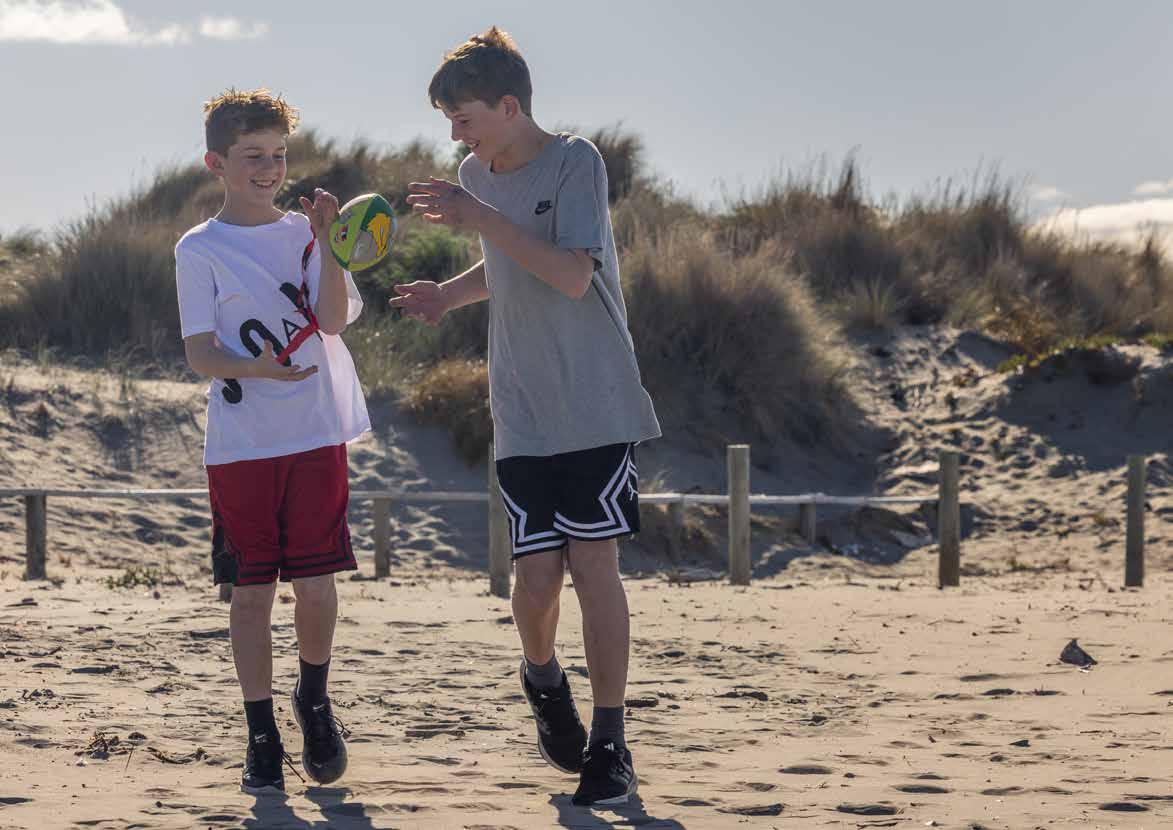
The Population Health Advisory Board (PHAB) has continued in its advisory board role over the last year. As a result of identified unmet need and growing concerns for continued access issues for priority populations, PHAB re-focused its priority to support system design that improves access to primary health care services in general practice and community settings.
PHAB acknowledges the capacity and workforce issues in general practice settings and the barriers these create for whānau accessing culturally responsive and timely primary health care services. To better understand these issues, PHAB has asked Pegasus to do a needs analysis so any quality improvement, equitybased system design solutions that improve access to health services for whānau and sustainable health care models for general practice, may then be considered.
PHAB continued in its key role of monitoring the implementation of the Pegasus Health Equity and Population Health Strategy | Kia atawhai ki te tangata (2022-2030), providing advice on aspects of both quantitative and qualitative data to monitor and inform health system design.
As part of Pegasus Health’s adoption of The Code of Expectations for Health Entities’ Engagement with Consumers and Whānau,
PHAB received presentations from front-facing services, and assessed them against the Code of Expectations, providing feedback and recommendations to the Here Toitū Service, Tautoko Hauora Service, B4 School Check Programme, and the Equally Well Collaborative.
PHAB continued to receive regular updates on the HPV screening implementation and its progress and provided feedback to the National Immunisation Team.
PHAB continued as a forum, receiving feedback and updates from Te Kāhui o Papaki Kā Tai, the Pacific Reference Group, and the Culturally and Linguistically Diverse Health Advisory Group.
In late 2023, PHAB farewelled Kim Burgess, a long-standing member of PHAB since 2018, and Irihāpeti Mahuika to take up her new role as Hawke’s Bay PHO Chief Executive Officer.
At the beginning of 2024, it was acknowledged PHAB remains critical to Pegasus but needs to be used for specific discussion to ensure it is purposeful. While the structure of PHAB will be continually reviewed, meeting frequency has been reduced to three times per year.
Renee
Noble
Population Health Advisory Board Chair
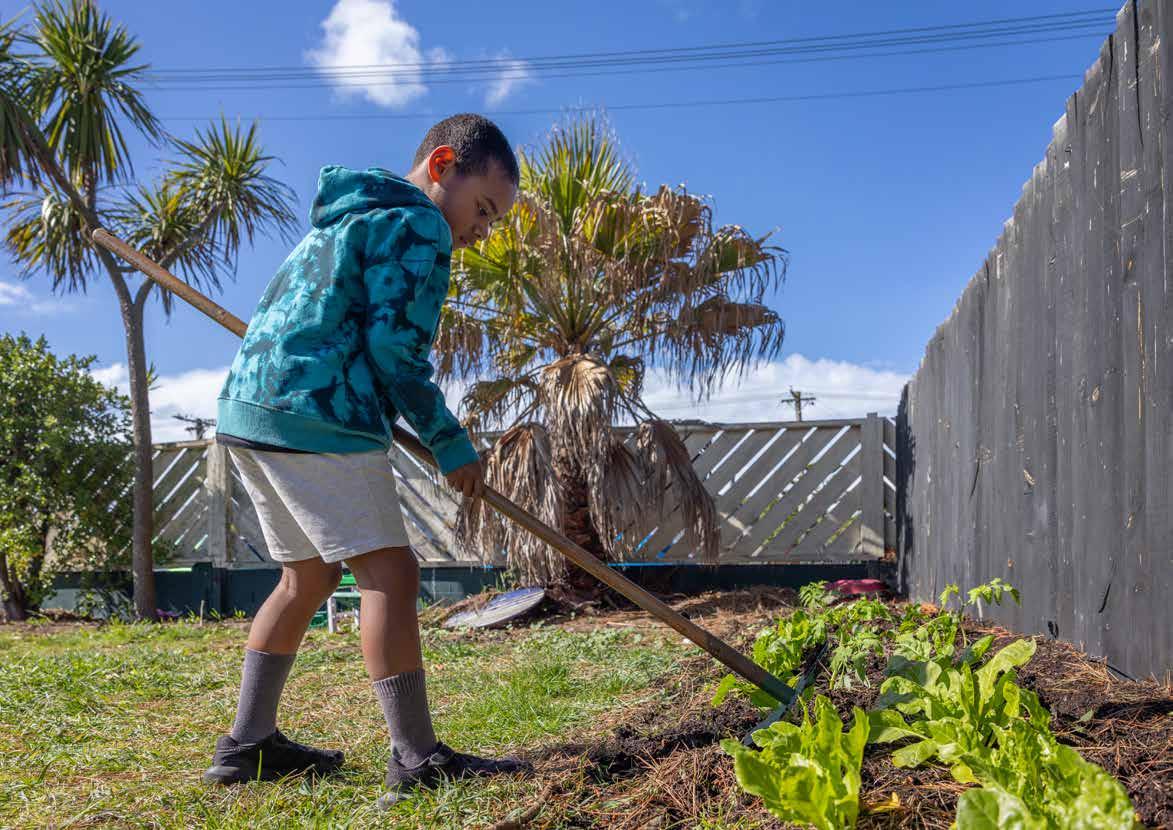
As the key clinical governance body for Pegasus Health delivered health services and the Pegasus primary care network, the Clinical Quality Advisory Board (CQAB), has a focus on clinical effectiveness, equity, quality improvement, patient safety, and ensuring an engaged and effective workforce.
The 2023 to 2024 year has seen a continued focus on implementation of the Te Pae Tata Interim New Zealand Health Plan and the challenges of high demand for health care, workforce constraints, and the widening equity gaps, such as childhood immunisation.
In early 2024, CQAB was invited to provide input and review of the development of the Pegasus clinical priority areas. The aim of these activities was to inform the Pegasus Board’s strategic planning concerning these clinical priority areas. In particular, barriers to access for health care, improving immunisation rates, and cardiovascular disease management.
CQAB also provided feedback on the establishment of a Clinical Advisory Pool (CAP). This pool is designed to gather input and advice from a wide and diverse range of perspectives from within the Pegasus network to ensure a comprehensive understanding and approach to health care practices and policies.
The group has also facilitated discussions between the clinical governance leads from all three Waitaha Canterbury PHOs, secondary care organisations, and has worked closely with the Population Health Advisory Board, 24 Hour Surgery, Acute Demand Service, and the Primary Care Taskforce.
Examples include:
• CQAB considered a proposal for review of Pegasus Primary Mental Health due to concerns and challenges with the current system which is at capacity. A discussion which was ongoing as a collective between the three PHOs. CQAB endorsed and supported the process of exploring the proposal further.
• CQAB continues to receive regular updates from the Primary Care Taskforce as it works through several initiatives to reduce high administration issues in practices and reduce capacity pressure in primary care.
Ongoing focus by the group has included supporting initiatives to improve equity of access, supporting workforce needs, and improving communication networks and access to data.
Ben Hudson
Clinical Quality Advisory Board Chair
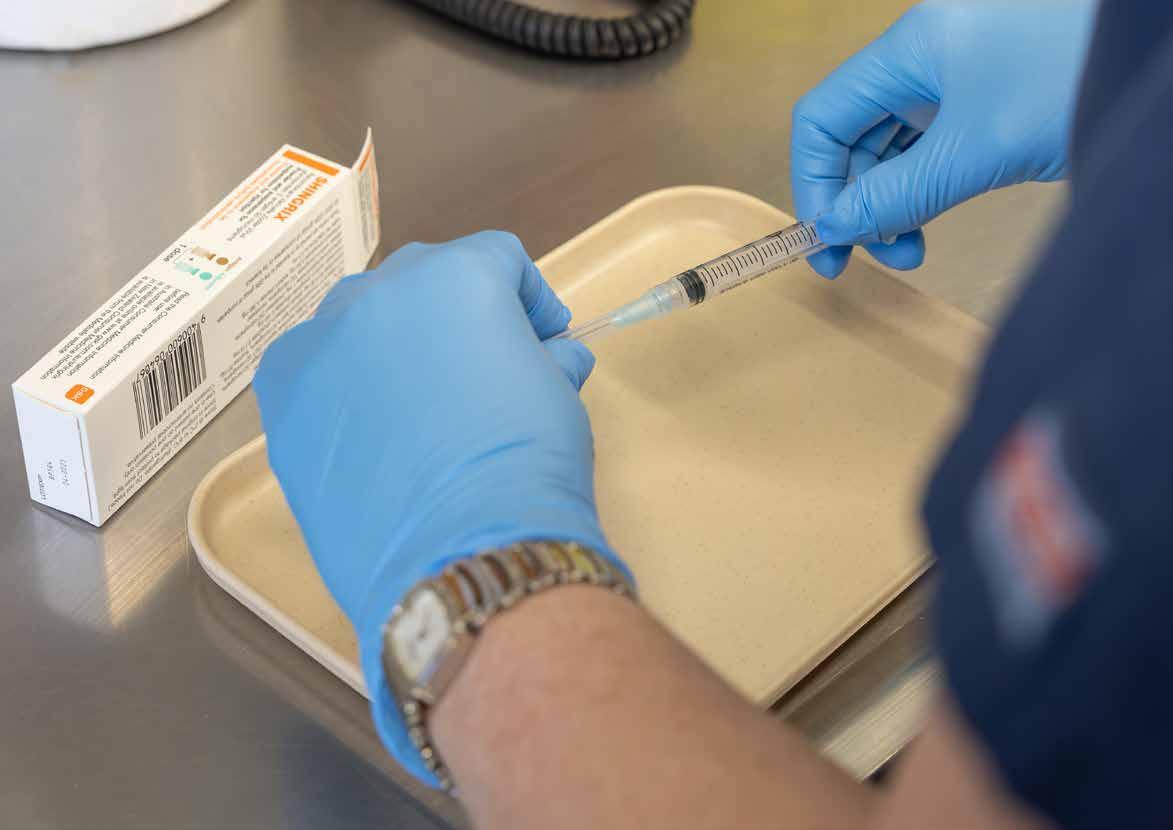
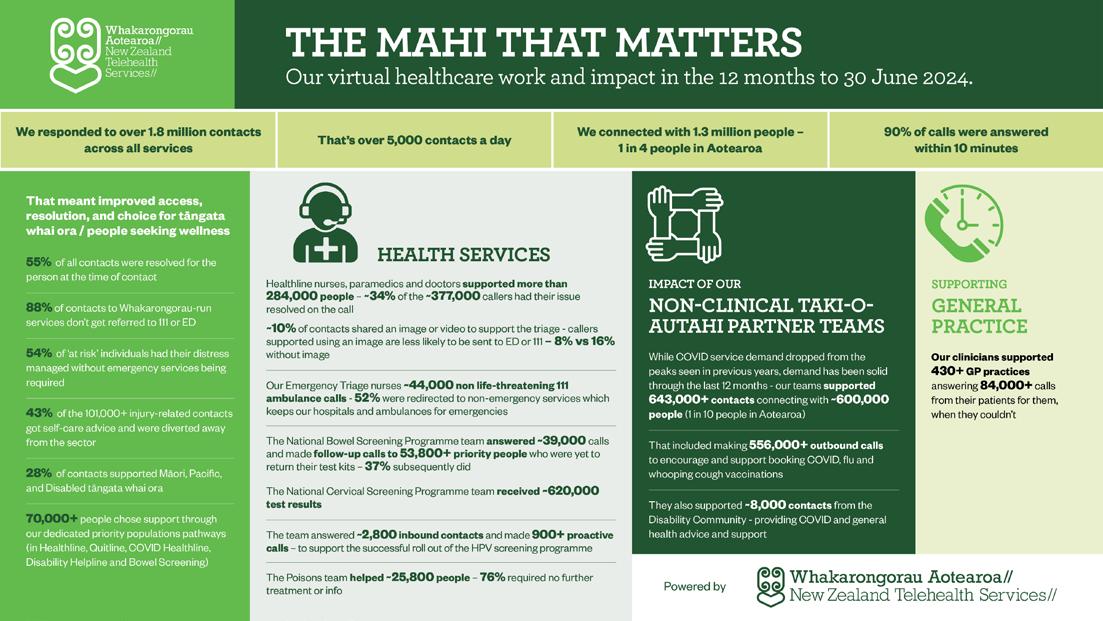
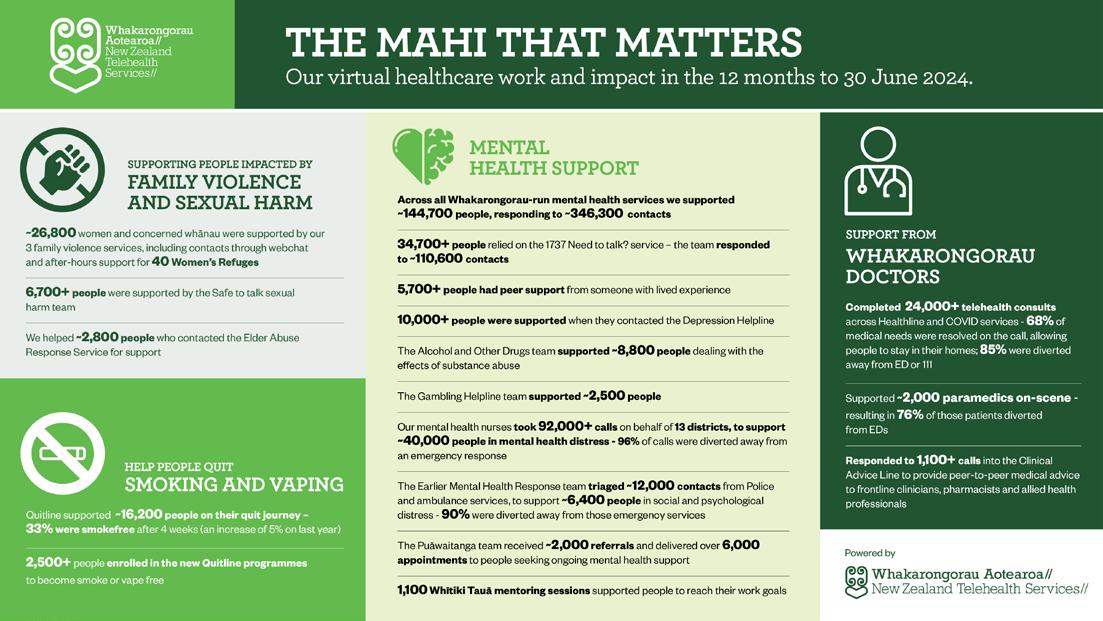
Enrolled Population
488,748
Enrolled Population as of 30 June 2024
47,428
14,695
77,757 presentations to 24 Hour Surgery

2,911 referrals to Acute Demand Community Nursing
14,488 services arranged by the Acute Demand Co-ordination Service

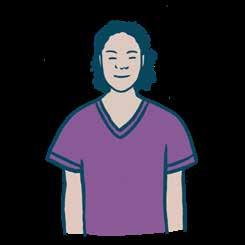
Tamariki who have had B4 School Checks
91% of Pegasus enrolled children have had a B4SC nurse check
Smoking support and advice 86% 85%
83.3% of Pacific Peoples Tamariki
Childhood immunisation
87.9% TAMARIKI VACCINATED
80.2% of Māori Tamariki
83% Māori of Pegasus enrolled children who identify as Māori have had a B4SC nurse check of smokers aged 15 to 74 received advice or support to help quit smoking.
